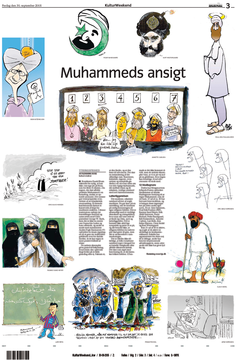
Back Das Gesicht Mohammeds ALS الرسوم الكاريكاتورية المسيئة للنبي محمد في صحيفة يولاندس بوستن Arabic Mohammed-Karikaturen BAR Карыкатурны скандал 2005—2006 гадоў Byelorussian Карикатурен скандал (2005 – 2006) Bulgarian জিল্যান্ডস-পোস্টেন মুহাম্মদ কার্টুন বিতর্ক Bengali/Bangla 12 crteža Muhameda BS Caricatures del Jyllands-Posten Catalan Kauza karikatur proroka Mohameda Czech Dadl cartwnau Muhammad Jyllands-Posten Welsh

| Jyllands-Posten Muhammad cartoons controversy |
|---|
The Jyllands-Posten Muhammad cartoons controversy (or Muhammad cartoons crisis, Danish: Muhammed-krisen)[1] began after the Danish newspaper Jyllands-Posten published twelve editorial cartoons on 30 September 2005 depicting Muhammad, the leader of Islam, in what it said was a response to the debate over criticism of Islam and self-censorship. Muslim groups in Denmark complained, sparking protests around the world, including violence and riots in some Muslim countries.[2]
Islam has a strong tradition of aniconism, and it is considered blasphemous to visually depict Muhammad. This, compounded with a sense that the cartoons insulted Muhammad and Islam, offended many Muslims. Danish Muslim organisations petitioned the embassies of Islamic countries and the Danish government to take action and filed a judicial complaint against the newspaper, which was dismissed in January 2006. After the Danish government refused to meet with diplomatic representatives of the Muslim countries and—per legal principle and in accordance with the Danish legal system—would not intervene in the case, a number of Danish imams headed by Ahmed Akkari met in late 2005 to submit the Akkari-Laban dossier. The dossier presented the twelve Jyllands-Posten cartoons and other depictions of Muhammad, some real and some fake, including one where they claimed he was portrayed as a pig, seen as forbidden and unclean in Islam. This last image was proven to be an Associated Press photograph of a contestant in a pig-squealing contest. When challenged, the delegation's press spokesman admitted the goal had been to stir up controversy.[3][4][5]: 80–4
The issue received prominent media attention in some Muslim-majority countries, leading to protests across the world in late January and early February 2006. Some escalated into violence, resulting in more than 250 reported deaths, attacks on Danish and other European diplomatic missions, attacks on churches and Christians, and a boycott of Denmark. Some groups responded to the intense pro-aniconist protests by endorsing the Danish policies, launching "Buy Danish" campaigns and other displays of support for freedom of expression. The cartoons were reprinted in certain newspapers around the world, while other media outlets declined to reproduce the images.
Danish prime minister Anders Fogh Rasmussen described the controversy as Denmark's worst international relations incident since the Second World War. The incident came at a time of heightened political and social tensions between Muslim majority countries and Western countries, following several, high-profile radical Islamic terrorist attacks in the West—including the September 11 attacks—and Western military interventions in Muslim countries, such as Iraq and Afghanistan. The relationship between Muslims in Denmark and broader society was similarly at a low point, and the conflict came to symbolize the discrepancies and idiosyncrasies between the Islamic community and the rest of society. In the years since, jihadist terrorist plots claiming to be in retaliation for the cartoons have been planned—and some executed—against targets affiliated with Jyllands-Posten and its employees, Denmark, or newspapers that published the cartoons and other caricatures of Islamic prophets, most notably the Charlie Hebdo shooting in 2015.
Supporters said that the publication of the cartoons was a legitimate exercise in free speech: regardless of the content of the expression, it was important to openly discuss Islam without fear of terror, also stating that the cartoons made important points about critical issues. The Danish tradition of relatively high tolerance for freedom of speech became the focus of some attention. The controversy ignited a debate about the limits of freedom of expression in all societies, religious tolerance and the relationship of Muslim minorities with their broader societies in the West, and relations between the Islamic world in general and the West.
Notably, a few days after the original publishing, Jyllands-Posten published several depictions of Muhammad, all legitimately bought in Muslim countries. This, however, drew little attention.
- ^ Henkel, Heiko (Fall 2010). "Fundamentally Danish? The Muhammad Cartoon Crisis as Transitional Drama" (PDF). Human Architecture: Journal of the Sociology of Self-knowledge. 2. VIII. Archived (PDF) from the original on 29 October 2013. Retrieved 25 November 2012.
- ^ Jensen, Tim (2006). "The Muhammad Cartoon Crisis. The tip of an Iceberg." Japanese Religions. 31(2):173–85. ISSN 0448-8954.
- ^ "Free speech at issue 10 years after Muhammad cartoons controversy". DW. Retrieved 7 November 2019.
- ^ Cite error: The named reference
responsibilitieswas invoked but never defined (see the help page). - ^ Cite error: The named reference
hansen&hundevadtwas invoked but never defined (see the help page).